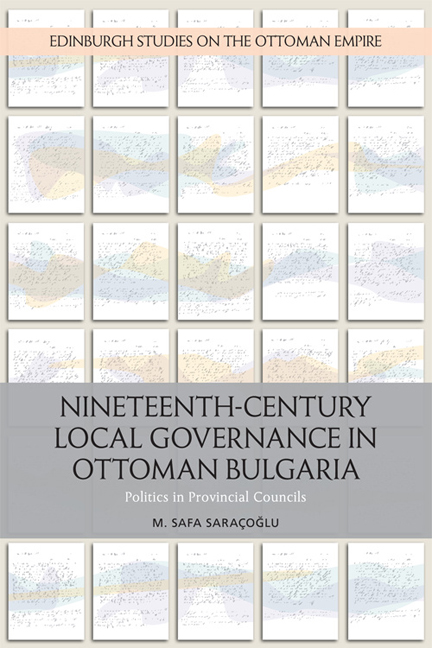Book contents
- Frontmatter
- Contents
- List of Maps, Figures and Tables
- Abbreviations
- Preface
- Map
- 1 Introduction
- 2 Contextualising the Nineteenth Century
- 3 Sitting Together: Local Councils and the Politics of Election in the County of Vidin
- 4 Once Inside the Chamber . . . Participation in the Politics of Local Administration
- 5 Writing Politics: Ottoman Governmentality and the Language of Reports
- 6 ‘Cattle Thieves’: Refugee Settlement, Ottoman Governmentality and Biopolitics
- 7 Conclusion
- Select Bibliography
- Index
5 - Writing Politics: Ottoman Governmentality and the Language of Reports
Published online by Cambridge University Press: 24 April 2021
- Frontmatter
- Contents
- List of Maps, Figures and Tables
- Abbreviations
- Preface
- Map
- 1 Introduction
- 2 Contextualising the Nineteenth Century
- 3 Sitting Together: Local Councils and the Politics of Election in the County of Vidin
- 4 Once Inside the Chamber . . . Participation in the Politics of Local Administration
- 5 Writing Politics: Ottoman Governmentality and the Language of Reports
- 6 ‘Cattle Thieves’: Refugee Settlement, Ottoman Governmentality and Biopolitics
- 7 Conclusion
- Select Bibliography
- Index
Summary
What would need to be studied now, therefore, is the way in which the specific problems of life and population were raised within a technology of government. (Foucault 1997a: 79)
On 2 May 1872 Vidin's administrative council concluded a lengthy report on the administrative council members of Berkofça (Bergovitsa) District. The report levelled some serious allegations against the district head (kaymakam) Mustafa ‘Ali Beğ, including negligence in a case involving the local police (zaptiye) beating several villagers, verbal harassment of council members and the sodomising by force of a shampooer in a public bath. The extended report, explaining how the case was handled, provides insight into this chapter's two interrelated themes: the administrative councils’ procedures and the politics of administration.
Unlike the former chapters which focused on the context in which Vidin County's councils were formed, their election procedures and regular functions within the provincial judicio-administrative sphere, this chapter focuses specifically on the reports that the administrative council wrote to the provincial capital, Ruse. I discuss the official reports on the events in Vidin County as components of the political processes centred on the local judicio-administrative sphere, arguing that the politics of local administration influenced the way these reports were written and thus our understanding of the events in Vidin County. The writing of reports and petitions and other provincial administrative/judicial practices (such as interrogations) constituted the Ottoman government at the local level. That is, following İslamoğlu's conceptualisation, I consider the government as a ‘hegemonic environment’ that is constituted through administrative and legal practices (İslamoğlu 2004a: 278). To maintain authority, the dominant groups must continually reconstitute the environment through negotiations that order social reality (such as laws that regulate access to and allocation of resources).
The first case I examine is an extensive one focusing of the malfeasance of the Berkofça District's head official. A detailed summary of this lengthy case in the first section is followed by an analysis of other sources on the district to provide a better understanding of the parties involved in the case. In the third section, I examine some structural aspects of the same case focusing on Ottoman governance to explore how the single government of state officials and local elites functioned in Vidin.
- Type
- Chapter
- Information
- Nineteenth Century Local Governance in Ottoman BulgariaPolitics in Provincial Councils, pp. 116 - 145Publisher: Edinburgh University PressPrint publication year: 2018



